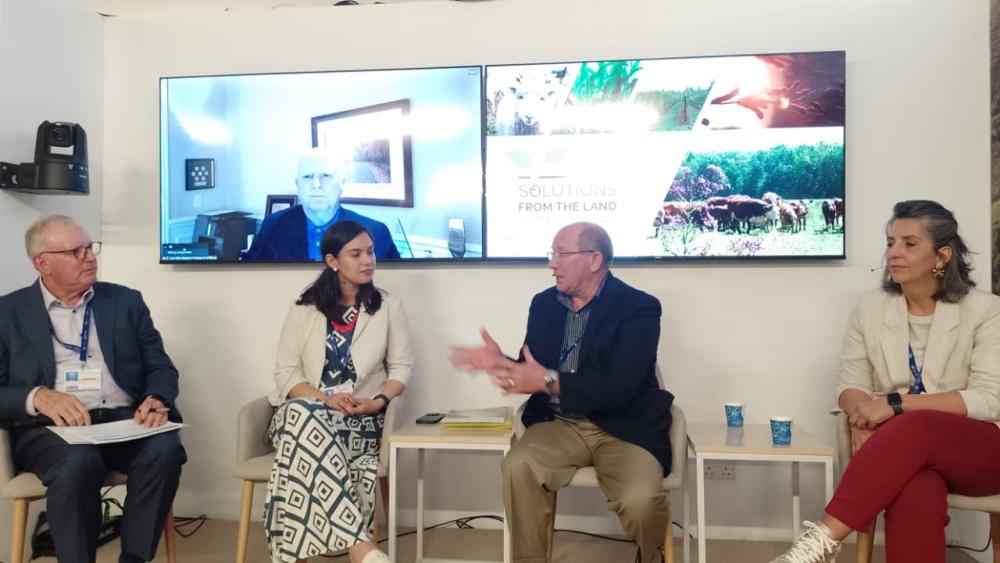In IICA’s pavilion at COP28, circular bioeconomy of the Americas introduces the world to its production model in harmony with nature

Dubai, United Arab Emirates, 6 December 2023 (IICA) - At the world’s most important environmental forum, the circular bioeconomy of the Americas demonstrated its importance as a tool for producing food, fibers and clean energies in harmony with nature, while guaranteeing global food and nutritional security and generating greater income for rural dwellers.
Agricultural producers, academic experts and private sector representatives attended the presentation, which was met with great interest, in the pavilion that the Inter-American Institute for Cooperation on Agriculture (IICA) installed at the United Nations Climate Change Conference (COP28) at Expo City in Dubai.
The event served as a sounding board for producers in the hemisphere who apply good practices that generate valuable benefits, for both themselves and consumers.
Among other things, the circular bioeconomy involves optimizing production systems by reusing waste, recycling, applying good water management practices, employing regenerative practices with bioinputs and manufacturing biomaterials, which contributes to both climate change mitigation and adaptation.
It therefore plays a key role in helping the world to achieve the goal set out in the Paris Agreement of keeping global warming from exceeding pre-industrial levels by more than 2 degrees Celsius.
Brazilian farmer Ana Carolina Zimerman, who prioritizes conservationist practices, and Ray Gaesser, a farmer from the state of Iowa in the United States, were two of the presenters.
Also participating were Grazielle Parenti, Head of Latin America at Syngenta, and professor John Reid, of the American Society of Agricultural and Biological Engineers (ASABE). The presentation was moderated by Ernie Shea, President of Solutions from the Land, an organization that fosters sustainable agricultural development as a solution to climate change and other global challenges.
IICA’s pavilion at COP28 is named “The Home of Sustainable Agriculture of the Americas”. For the second consecutive year, the pavilion, which was also installed at COP27 in Egypt, is hosting high-level discussions on the role of regional agriculture in mitigation and adaptation efforts.
Generating greater income
Ana Carolina Zimerman stated that she has only been an agricultural producer for a few years and that her perspective shifted once she began to ask herself how livestock farmers could generate income not only from meat production but also from other goods and services they can provide.
“In cities, many people have a poor image of producers, despite the fact that we are the ones who produce in harmony with nature and are the ones most interested in taking care of it. We must bridge the gap between the countryside and cities, where people must realize that those of us in rural areas are not generating problems, but rather creating solutions”, remarked Zimerman, who expressed pride in her country, which, in recent decades, went from being an importer of agricultural products to an exporter thanks to the use of science, technology and research and the application of environmental restoration techniques.
The Brazilian farmer also noted that, beyond its environmental benefits, the circular bioeconomy also affords significant productive advantages and therefore has a positive impact on the three pillars of sustainability, which are of an economic, social and environmental nature.
“Regardless of the country or region, farmers are always trying to innovate, care for the environment and generate income to support their families”, maintained farmer Ray Gaesser, who has been producing in Corning, Iowa, since 1977 and is actively involved in his community. Having held positions in various producer associations, Gaesser is a proponent of regenerative practices and the generation and use of renewable energies for agricultural production.
Grazielle Parenti of Syngenta, who is based in São Paulo, considered that the great secret behind agricultural production, like any other business, is producing more with less, and explained that the circular bioeconomy serves as the ideal tool to achieve that goal. “Brazil, for example, has legislation that makes producers responsible for the waste they generate. So, all companies are looking to identify opportunities available to reuse waste. This is very positive for the countryside, given that all waste can be converted into something valuable”, explained the executive.
Parenti reviewed the great innovation movement that is currently underway in rural areas of the Americas. “Many are considering how to produce energy locally, either with solar panels or with biodigesters that process waste from animal production. They are also assessing ways to produce biofertilizers from waste. The bioeconomy is generating valuable opportunities for both small-scale producers and large companies, which are investing. There is a lot going on in the field”, emphasized Parenti.
Johnn Reid also shared an optimistic outlook, referring to the possibilities afforded by the circular bioeconomy. In that regard, he encouraged the production and academic sectors to quantify and disseminate the results to the general public. “We must foster greater innovation and the generation of greater value added in biological products. To that end, it is important to raise awareness and educate consumers, as well as establish partnerships that will enable us to expand our reach. All waste has value, but we cannot expect society to understand that right away. Just as rural producers are part of the solution to climate change, so are consumers, and that is why we must help them to become involved”, noted Reid.
Margaret Zeigler, IICA Representative in the United States, was also a presenter at the event.
More information:
Institutional Communication Division.
comunicacion.institucional@iica.int